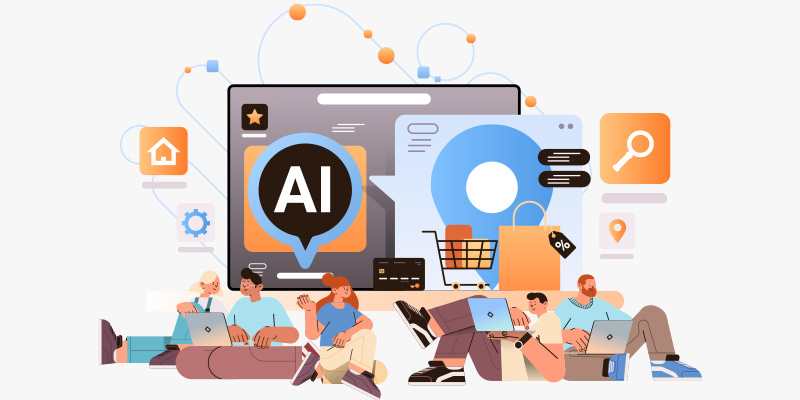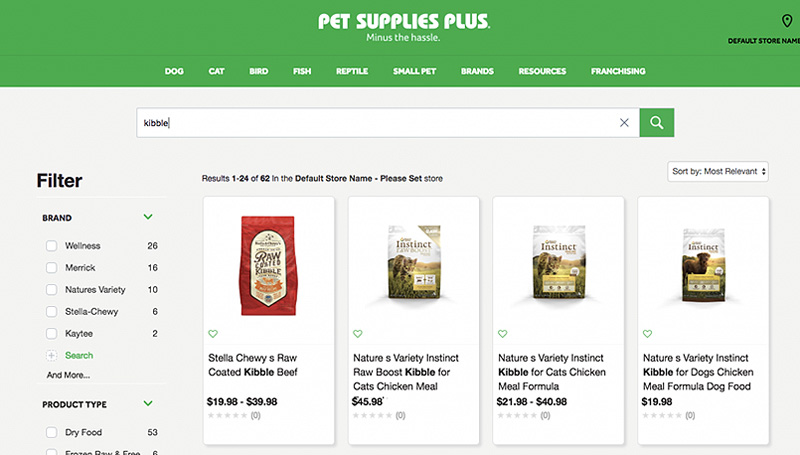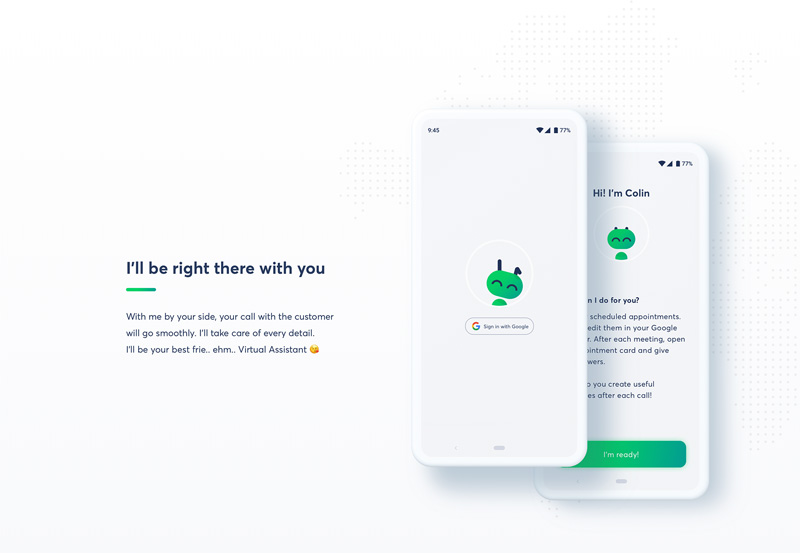How to Leverage AI Tools for E-Commerce Website Conversions

Featured Image: iStock/gmast3r
When we first hear the word ‘Artificial Intelligence,’ the first thing that comes into our mind is Steven Speilberg’s film A.I. Artificial Intelligence or Terminator, where a rogue robot is hell-bent on destroying the world. However, today, this term has evolved, and AI tools and applications are used in every industry and sector of our lives, from large-scale industries to shopping, mobile phones, offices, and ecommerce.
Talking about AI tools for e-commerce website marketing for instance or applications, we have to consider the fact that they provide tons of benefits to sellers and users alike. AI product discovery tools can help customers find relevant products based on their past purchases and online behavior. The importance of integrating AI with e-commerce websites is no longer a debate or question but a reality. Countless studies demonstrate that AI helps engage customers and drive sales to increase growth and profit.
The question everyone should be asking is how to use AI in your ecommerce strategy rather than waiting for solid proof. If you are an ecommerce store owner, here is a detailed guide regarding how to use AI tools for ecommerce website conversions and what advantages they provide. So, without further ado, let’s get started.
What is AI in E-commerce?
Artificial intelligence in AI refers to using AI tools, applications, (e.g. a recycling identifier by picture) and algorithms to streamline your operations and provide personalized experiences to users and visitors. AI helps to understand, learn, solve problems, and give relevant solutions to business owners. Today, you can use tools to create ecommerce logos for your online business as well.
There are quite a few positives of using such technology to streamline business processes and increase productivity.
Benefits of Using Artificial Intelligence in Ecommerce Stores
Here are a few benefits you get by using AI tools in your ecommerce strategy.
1. Improves Operational Efficiency
AI helps automate routine and time-consuming/repetitive tasks, which helps speed up the shipping process and provide faster delivery times to customers. This helps in improving customer satisfaction which in turn increases ecommerce website conversions. Other than that, it also frees up your human employees to focus on work that requires serious human attention, care, and complex thinking.
For example, nowadays, Amazon uses a robot named Kiva to pick items off shelves and deliver them to employees in its warehouses.

Image Source: waredock.com
2. Provides Data-Driven Accuracy
Using data analysis, AI helps provide a targeted recommendation to visitors that helps improve user engagement and ultimately convert them. When users find something of their interest, they are more likely to browse around and see what else the store has to offer. Who knows, they might find something of value and add it to their cart to purchase later on.
The best example, you can look at how Netflix uses AI algorithms to analyze user history and gives movie and TV series recommendations, which may be horror, action, or comedy. Even Amazon and eBay use the same strategy to increase ecommerce website conversions with AI tools, and you might have noticed it too!
3. Tailored Experiences
It is a type of personalized experience, but we believe it helps get the most loyal customers and increases user engagement and satisfaction. By eliminating some of the guesswork involved in online shopping, it increases conversion rates and reduces return rates. With key UX elements for ecommerce conversions, you can engage people from the first look and encourage them to keep coming back too.
Sephora’s virtual artist app uses AR (augmented reality), where users can try makeup and see what they might look like in real life. Some other stores also offer to try clothes and apparel in an AR/VR environment to allow users to observe if it suits them or not.

Image Source: fashionnetwork.com
The website design also plays an important role in delivering tailored experiences. AI-driven website design tools for ecommerce business marketing can be leveraged to make a positive impressions on potential customers and convert leads.
4. Targeted Marketing Campaigns
Another benefit of AI in e-commerce is that it helps to target customers in marketing campaigns based on their preferences, demographics, and behavior. Such campaigns have higher click-through rates and provide better conversion. This leads to a boost in ecommerce website conversions in both the long and short terms.
For this purpose, businesses use Natural Language Processing (NLP) and sentiment analysis in AI to understand and track customer and see what they like and where their interests lie so businesses can tailor their marketing messages accordingly.
5. Managing Fraudulent Activities
AI can be used to assess risk and detect fraud, which provides a high level of security. Through this real-time analysis, financial losses can be reduced and customer trust can be maintained. As cybersecurity threats become more prevalent, AI’s role in risk mitigation becomes more and more essential.
As the prevalence of AI technology in ecommerce grows, it is crucial to address safety in AI systems to protect sensitive data and operations. Ensuring robust security measures against threats like data breaches and credential theft can significantly improve customer trust and prevent financial losses. Implementing strict protocols for AI security can also aid in maintaining compliance with industry standards.
For example, Stripe analyzes thousands of real-time signals to identify and prevent fraudulent transactions.
How to Integrate AI in E-commerce Stores for Maximum Benefit
Here are a few ways to leverage AI tools to increase ecommerce website conversions and gain the benefits you desire in a short time.
1. Setup an AI-powered site Search
The time has come to correct your site search strategy if it has been an afterthought up to now. The client must be able to find what they are looking for to create a positive customer experience and ultimately convert them into customers. Firstly, make sure you set up a professionally designed website and then move on to UX elements like search and navigation.
Customers expect you to deliver a level of service that is comparable to or better than everything else they encounter daily through digital channels.
Several studies have demonstrated that contextually relevant site search experiences can increase conversions by as much as 216%.. With personalization through the use of artificial intelligence, you can boost ecommerce website conversions effectively. And early adopters have even seen a return on investment.
What does it look like when a website is optimized for search?
Pet Supplies Plus did a great job implementing intelligent site searches to ensure that their customers were provided with relevant results. Customers can obtain relevant query suggestions and popular search results through its AI-powered search solution.

Image Source: petsuppliesplus.com
With AI, it’s possible to deliver customized recommendations for every person as they type in the search box by looking at various factors, such as the visitor’s location, time of day, previous searches, and purchases. It is known as mass personalization, and this can only be achieved due to the system of scalable machine learning algorithms, which enables a one-to-many experience to be transformed into a one-to-many experience.
Upon completing their search, customers expect to see personalized, relevant results with products they want to purchase. By optimizing your search experience in conjunction with AI’s effectiveness, you will find that your customers will not only be more inclined to make the initial purchase because they will find what they need more quickly, but they will also be more inclined to buy more as a result.
2. Intelligent Product Recommendations
In a study conducted by Barilliance, personalized product recommendations generated over 31% of ecommerce revenue. The consumer has repeatedly expressed the desire for relevance. In another study, 60% of respondents stated that they find eCommerce websites that offer personalization valuable.
In particular, machine learning provides the foundation for personalized product recommendations. Generally, AI algorithms determine which product will be most appealing to two visitors with similar profiles by comparing two (or more) options: for example, given two visitors with the same profile, an AI algorithm will evaluate which product would be most appealing to both. Given a certain profile, the algorithm may begin to recommend the more successful option – increasing conversions by doing so.
There is a smart product recommendation system available on the ASOS website: this algorithm creates product suggestions based on similar products and a customer’s previous purchases.

Image Source: asos.com
There are many ways in which AI can learn and improve – all by itself. In this regard, improving product recommendations using machine learning is a surefire method for increasing ecommerce website conversion rates.
For years, Amazon has enjoyed these advantages thanks to its personalized and dynamic product recommendations, which account for about 35% of the company’s total revenue.
3. Dynamic Headlines and Description of Products
Just as AI can simplify customer search and recommend products, predictive algorithms can determine which product headlines and designs convert best. The algorithm uses continuous A/B Testing to determine which headline variation, text size, and button style yields higher returns.
Sokoglam a Korean beauty store, has generated AI headlines and product descriptions using machine learning. You can visit and read for yourself if you want to.

Image Source: sokoglam.com
When you are working on your website, keep in mind that your logo design needs to be versatile and eye-catching. You can always consider launching a logo contest and pick a winning icon that represents your brand closely.
4. Customer Segmentation
Using artificial intelligence tools, eCommerce marketers can gain a deeper understanding of their customers. A computer system that uses artificial intelligence can analyze complex behaviors and traits to optimize audience segmentation and increase conversions.
With the help of these intricate insights, marketers can create their segmentation or automate the process. In either case, they will benefit from data analysis that would not have been possible without the use of artificial intelligence.
With your current marketing stack, you can implement this kind of segmentation. Marketers can use AI learnings to improve their ad targeting by implementing tools such as Google Smart Shopping and Facebook’s dynamic ads. A third-party AI tool such as Adspert or Teradata can also be implemented.

Image Source: Freepik.com/freepik
5. Optimizing Prices
By analyzing supply demand sales trends and other market dynamics, AI tools are capable of determining when and what to discount. With this method, eCommerce brands can price their products optimally and eliminate the guesswork of product pricing
In this way, brands can maximize sales volume and profit margins while remaining competitive.
A Digital Shelf tool can be useful for brands selling on multiple channels, as it monitors pricing across all channels. By doing this, you can adjust your price tags if the price of your products changes at a third-party retailer. You’ll also be able to access real-time data and analysis when you need to negotiate pricing levels and increase ecommerce website conversions.
6. Chatbots Powered by Artificial Intelligence
The use of customer service chatbots has been part of AI eCommerce for some time. By answering simple questions and queries, they can assist customers in navigating the sales funnel throughout the day and night. However, chatbots are getting better and can now provide tasks such as virtual assistance, gift recommendations, and simple transactional functions. To take all the advantage of AI chatbots, you can consider integrating them into your websites by using chatbot tools or WordPress ChatGPt plugins.
Chatbots are now capable of handling more complicated requests and providing a more personalized experience when it comes to providing support. They are also integrated within different tools, such as CRM systems, contact center software, and social media platforms, to provide eCommerce businesses with enhanced customer service experiences. They are an integral factor to pay attention to in your e-commerce branding strategy. It is even possible to set up a chatbot that can access your customer database to provide helpful and individualized responses in real time.

Image Source: behance.net/Netguru Team and Robert Raimann
7. Management of Inventory Based on Data
By taking into consideration variables such as lead times, carrying costs, and fluctuating demand, AI-driven inventory management systems can assist you in optimizing your inventory levels.
You can use these tools to forecast demand for certain products and receive alerts when there is a shortage of inventory. In the event of an unexpected stockout, you can place a re-order as soon as possible, thus preventing lost sales and customer dissatisfaction.
By optimizing inventory levels, AI can also reduce storage and warehousing costs.
8. Preventing and Detecting Fraud
Payment fraud and account takeover are some of the forms of fraud that can occur on ecommerce platforms. There is a projection that e-commerce fraud losses will exceed $48 billion worldwide in 2023.
It is possible to detect anomalies and potentially fraudulent activities in real time using AI algorithms that analyze transaction data and user behavior patterns. A purchase that is unusual in terms of amount, shipping address, or method of payment falls into this category. If suspicious activity is detected by the system, security measures can be triggered or the appropriate personnel can be notified. In this manner, fraudulent transactions can be prevented immediately.
The market is full of tools that can detect and prevent fraud in e-commerce transactions. There is a well-known AI detector tool called Kount that is suitable for businesses at all levels of the e-commerce industry.
Implementing Artificial Intelligence in Ecommerce
Taking advantage of emerging technologies is always tempting. The key to making sure you don’t waste resources is to have a roadmap before launching a new program.
1. Develop a Strategy
As with any endeavor, you must begin somewhere – and you will need a strategy to assist you in achieving your AI goals. Rather than allowing this to be handled by a newly recruited AI specialist or your CIO, take charge of it yourself.
Think carefully about what you wish to accomplish with artificial intelligence. Don’t hesitate to start small and take a practical approach. As you progress, you will be able to build upon your successes and generate higher revenue with increasing ecommerce website conversions. You can use an AI logo maker to create one for your e-commerce website.
2. Identify Use Cases That Contribute to Company Strategy
AI use cases that are the most successful are those that meet business objectives, differ from data in a meaningful way, and utilize models of artificial intelligence that are readily available. In summary – look for revenue opportunities in contexts where data and AI technology can be applied.
3. Utilize the Expertise of Third Parties
Despite your in-depth knowledge of artificial intelligence, you will want to obtain expert advice on this matter. Consider bringing in a professional team to assist you with building a strategic AI roadmap on a part-time basis or as part of a project. It is also possible to utilize third parties to assist with MVP development (minimum viable product).
4. Create a Comprehensive Solution
As soon as you are confident in the results of your team’s work, it is time to build your full-scale solution. It may still take a few attempts before it works as expected. With experience and familiarity with AI, your company can achieve greater results and meet business goals with higher ecommerce website conversions.
Conclusion
These are a few ways you can utilize AI tools for ecommerce website conversions to deliver the best possible shopping experience. This technology can assist you in making the most of the data you receive from your customers and business to set a course for your future.
A successful e-commerce platform relies heavily on website design. By utilizing an AI-powered website customization platform, you can streamline, automate, and scale your personalization efforts.



